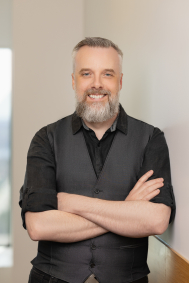Jean Philippe Chenel
Master’s (2005) and Ph.D. (2011) in water sciences
Director of innovation, Consortium for research and innovation in industrial bioprocesses in Quebec (CRIBIQ)
“At INRS, the students do their own research. We use the tools in the laboratory and do our own experiments. You understand better and learn so much more by doing everything yourself.”
With his inquisitive nature, Jean Philippe Chenel likes to understand how everything works. That’s what led him to set up and manage some of the most important fermentation and electronics innovation infrastructures at the heart of economic development in the Trois-Rivières region. His curiosity was also fuelled by his studies in water sciences at INRS.
Although his undergraduate biology classes at the Université de Montréal numbered almost 200 students, Jean Philippe Chenel took a course in environmental microbiology that piqued his interest in the role of bacteria in the environment. Several of his friends went on to study biology and ecotoxicology in particular, including two who suggested he explore the programmes at INRS. It was a student, Simon Barnabé, now a professor at UQTR and member of the INRS-UQTR joint research unit on materials and technologies for the energy transition, who showed him around the facilities of the Centre Eau Terre Environnement in Quebec City and persuaded him to undertake a master’s degree in water sciences in the laboratory of Professor Rajeshwar Dayal Tyagi.
Although he feels that his doctoral studies were “an ordeal,” Jean Philippe learnt a great deal about the work of a researcher, and his subject, the production of thermostable proteases in sewage sludge in order to explore their use as bioproducts, fascinated him. “It was a cutting-edge field in Quebec. The research carried out by the whole team of students laid the foundations for all the significant advances that have been made over the last 15 years and which are now enabling companies to prosper.”
He enjoyed his interactions with Jean-François Blais, who has developed expertise in bioremediation and is also a former student of Professor Tyagi’s laboratory. He has also been involved in student life, chairing the student association and sitting on the INRS board of directors as a student representative. He also helped set up the INRS Student Federation, which brings together the associations of the four research and training centres. He contributed to improving conditions for the student community, in particular by setting up group insurance cover.
In his own opinion, these commitments were unnatural and took him out of his comfort zone, “I was a rather withdrawn young person at the time. It was another student who put me forward as the student representative for the master’s programme in water sciences. I developed a number of skills by doing that, and it made me want to get even more involved,” he says. “In a way, it’s this experience that allows me to sit on the UQTR board today,” he adds.
What he particularly remembers about his time at INRS is the closeness with the various members of the community. “It was much easier to interact with the professors than at the Université de Montréal. You bump into them in the corridors, you can ask them questions, you can see that they’re happy to talk to each other - it’s the complete opposite of an ivory tower,” he sums up. “I’ve learnt a lot. Even though the positions I took as a student representative or as president of the student association were not always in phase with those of the centre’s director, Jean-Pierre Villeneuve, he was always there to give me a hand and help me move my issues forward,” he points out. “I’ve always had a very good relationship with him,” he says.
He also learnt about the workings of a large research infrastructure by working in the Environmental Biotechnology Laboratory. “In a small institution like INRS, the students do their own research. We use the tools in the laboratory and do our own experiments. You understand better and learn so much more by doing everything yourself,” he says. He feels that it has also given him a good understanding of how such facilities operate: “I’ve learned how to operate fermenters, understand them, repair them... This in-depth knowledge of the operations and functioning of a fermenter unit (bioreactors), which went beyond my tasks as a student, paved the way for the rest of my career,” he points out. After graduating from INRS, he spent a decade as Director of the Technocentre and Biosafety Advisor at Innovation et Développement économique Trois-Rivières, where he was setting up and managing the operations of a new technology unit made available to various companies.
He did not see himself becoming a university professor, but he is happy to have chosen the path of private enterprise, while drawing on his knowledge of research and his expertise in bioprocesses and biotechnologies on a daily basis to promote innovation and links between industry, universities and college technology transfer centres. At CRIBIQ, he is responsible for all aspects of bioprocessing and the environment. Although a little removed from research, he is in his element in trying to bring companies and researchers together.
Looking back, he advises INRS students to be proud of the extraordinary knowledge they have acquired along the way: “You are the best in the world on the subject that was the subject of your research project. Be confident, and explain your contribution and the skills that this experience has enabled you to develop,” he insists. He also encourages them to take full advantage of university life and get involved in activities, the student association and various events. “That’s how I met people who opened doors for me.” He concludes by saying, “INRS is still very close to my heart, it’s an experience that has left me with a strong sense of attachment.”
[Interview conducted in September 2023.]

